Introduction
The integration of social media marketing into the healthcare sector represents a transformative shift in how medical professionals connect with patients and promote their services. As healthcare organizations increasingly recognize the significance of a robust digital presence, they are adapting their strategies to effectively leverage platforms like Facebook, Instagram, and LinkedIn.
This article delves into the various facets of social media marketing tailored specifically for healthcare professionals, exploring:
- Its importance
- The selection of appropriate platforms
- The creation of engaging content
- The ethical considerations that must be navigated
With projected growth in healthcare advertising and the rising influence of AI in marketing strategies, understanding how to harness these tools is essential for improving patient engagement and outcomes.
Defining Social Media Marketing for Healthcare Professionals
Social media marketing for doctors involves the strategic use of social media platforms to effectively promote medical services, interact with clients, and share health-related information. This approach is tailored to navigate the distinct challenges and regulatory requirements inherent in the medical sector, ensuring that communications remain compliant while fostering effectiveness. Key activities in this marketing strategy include:
- The dissemination of educational content
- Prompt responses to inquiries
- The cultivation of a vibrant community centered around pertinent health topics relevant to the practice
With the growing recognition of the importance of digital presence, medical organizations are increasingly allocating resources towards content marketing. As projected by the IMARC Group, medical advertising is expected to rise from $22.4 billion in 2022 to $29.2 billion by 2028, highlighting a significant shift towards enhanced investment in content generation and patient engagement initiatives. Notably:
- 97% of marketers believe AI will enhance their careers
- 93% of medical marketers believe AI will positively impact their organizations
- Nearly half expect a major transformation
Furthermore, of more than 1,500 hospitals nationwide with an online presence, Facebook remains the most popular platform. This alignment with evolving marketing trends is crucial for medical professionals aiming to leverage social media marketing for doctors as a powerful tool in their practice.
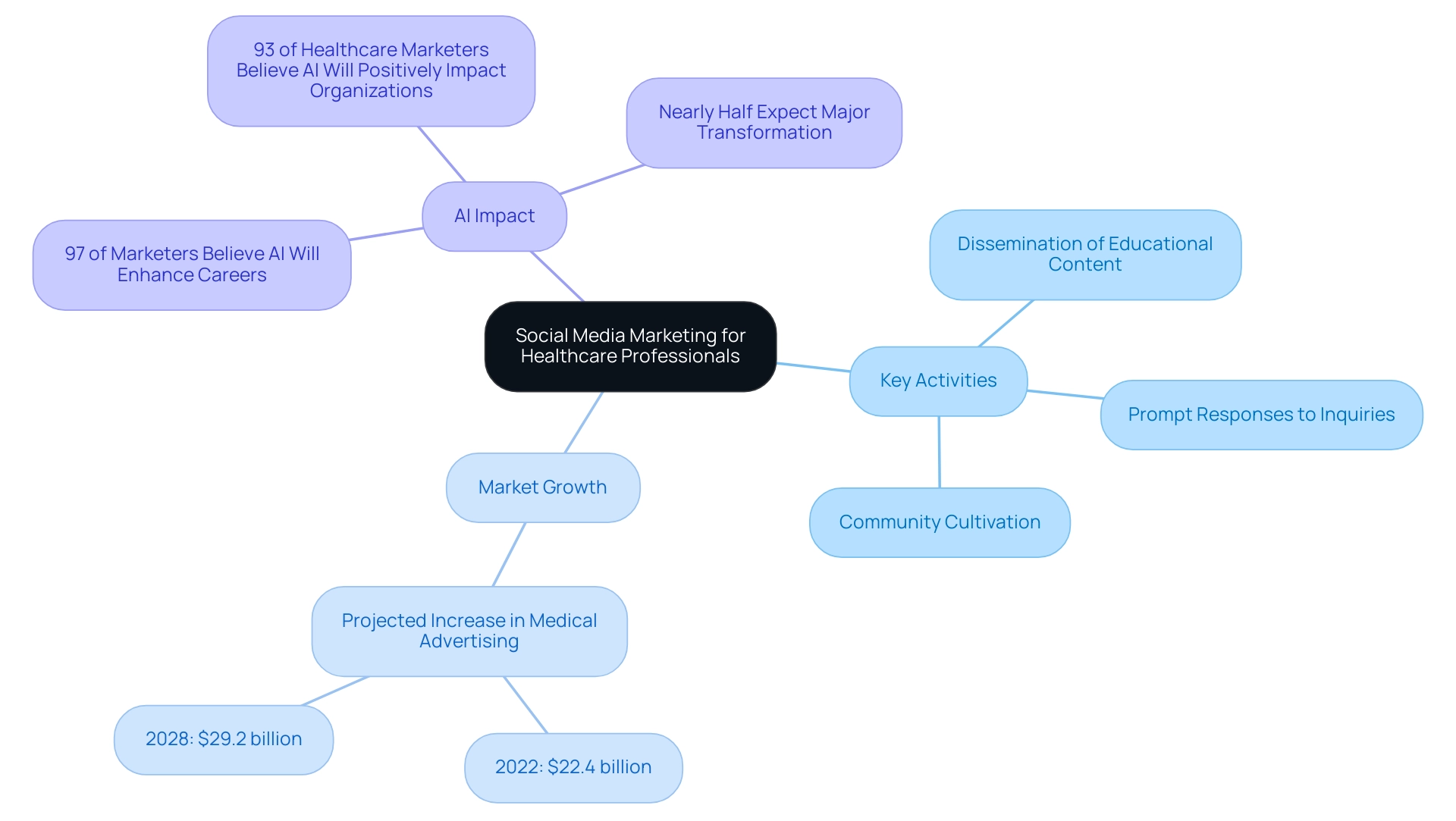
The Importance of Social Media Marketing for Doctors
Social media marketing for doctors has become an essential resource for medical practitioners, enabling them to engage with a broader audience and establish a trustworthy online presence. Through social media marketing for doctors, engaging individuals on platforms like Facebook, Instagram, and Twitter allows them to disseminate valuable information, promote their services, and build meaningful relationships. Significantly, Facebook stands out as the most favored networking platform among hospitals, indicating that healthcare professionals should focus their efforts where they can attain the greatest impact.
By utilizing online platforms, doctors can assist in patient education, elucidating intricate medical procedures and health issues, which leads to improved patient outcomes and contentment. Continuous optimization and analysis of these social media strategies are essential for improving call conversions and addressing any issues that may affect ROI. According to Pete Kiehart,
Not convinced yet?
Here, we share the top medical marketing statistics of 2024 to show how content marketing can help guide one through an increasingly complicated landscape. This reinforces the necessity for medical providers to adapt their strategies for social media marketing for doctors in a rapidly evolving digital environment, ensuring they effectively engage individuals and address their needs. Furthermore, it’s important to acknowledge that the articles referenced in this discussion were published between 2016 and 2020, highlighting the ongoing relevance of these insights in today’s medical marketing landscape.
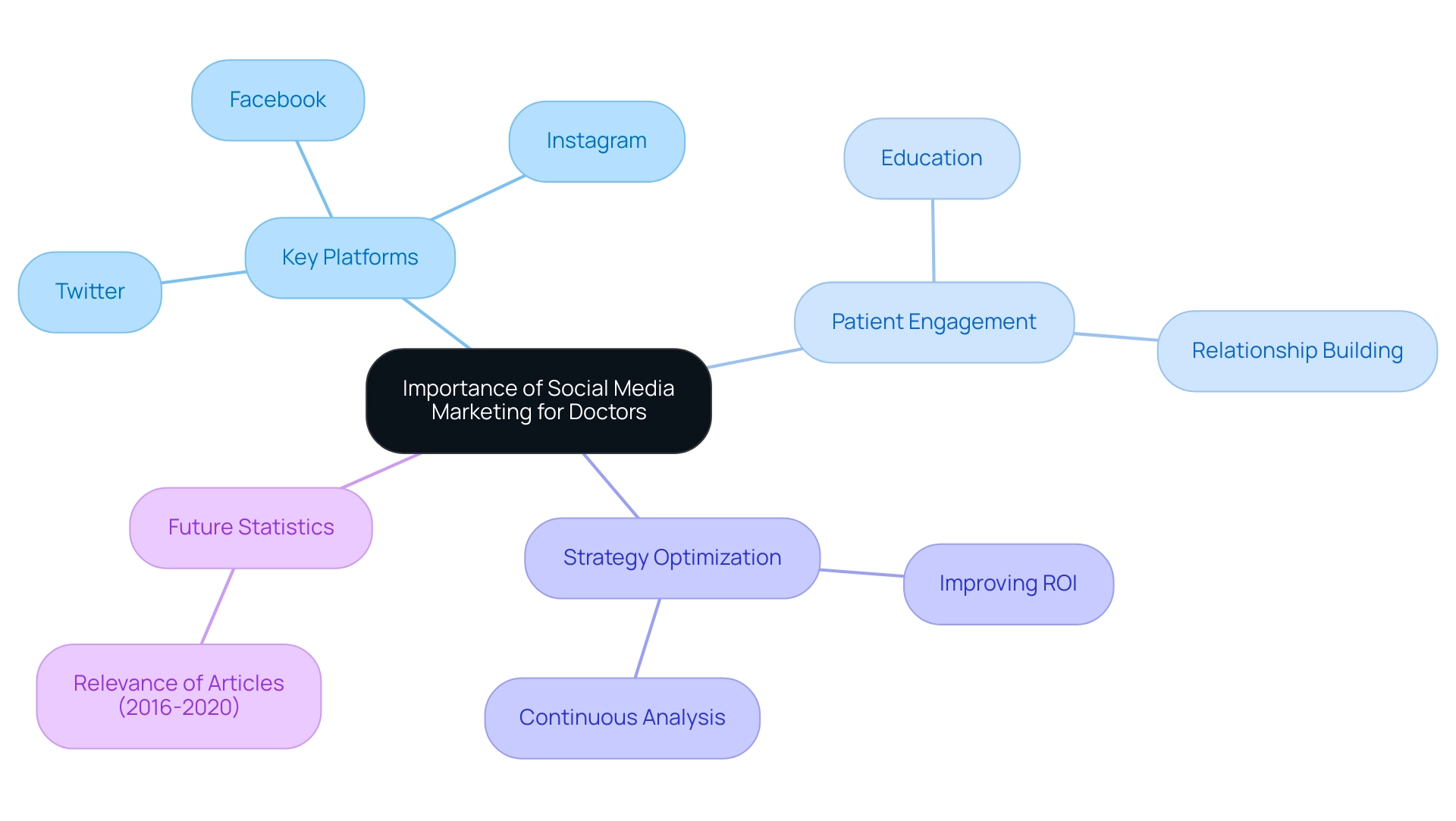
Choosing the Right Social Media Platforms for Your Practice
Choosing suitable social networking sites is crucial for healthcare providers involved in social media marketing for doctors to connect effectively with those they serve. Each platform offers unique advantages that can enhance communication and outreach.
- Facebook, for instance, excels in fostering community interactions and disseminating updates, making it ideal for building patient relationships.
- In contrast, Instagram functions as a powerful platform for visual storytelling, enabling practitioners to share health tips and provide behind-the-scenes glimpses of their practices.
- LinkedIn is particularly advantageous for professional networking and sharing industry-related insights, thereby enhancing a doctor’s professional presence and credibility.
Comprehending the demographics and user behaviors on these platforms is essential; for instance, recent statistics show that health researchers have effectively employed media for facilitating research (n=45 respondents) and professional development (n=34 respondents).
This knowledge empowers service providers to tailor their content and engagement strategies effectively for social media marketing for doctors, ensuring their marketing efforts resonate with their target audience. As Junhan Chen emphasizes, several new applications have arisen since 2013, including advancing health research and practice, community mobilization, and facilitating offline health-related services and events.
Moreover, considering the future, the case study on upcoming trends in digital platforms and healthcare indicates that emerging tendencies may involve greater utilization of AI and tailored content to improve user involvement and communication.
By aligning their online strategies with these evolving trends, doctors can significantly enhance engagement and communication using social media marketing for doctors.
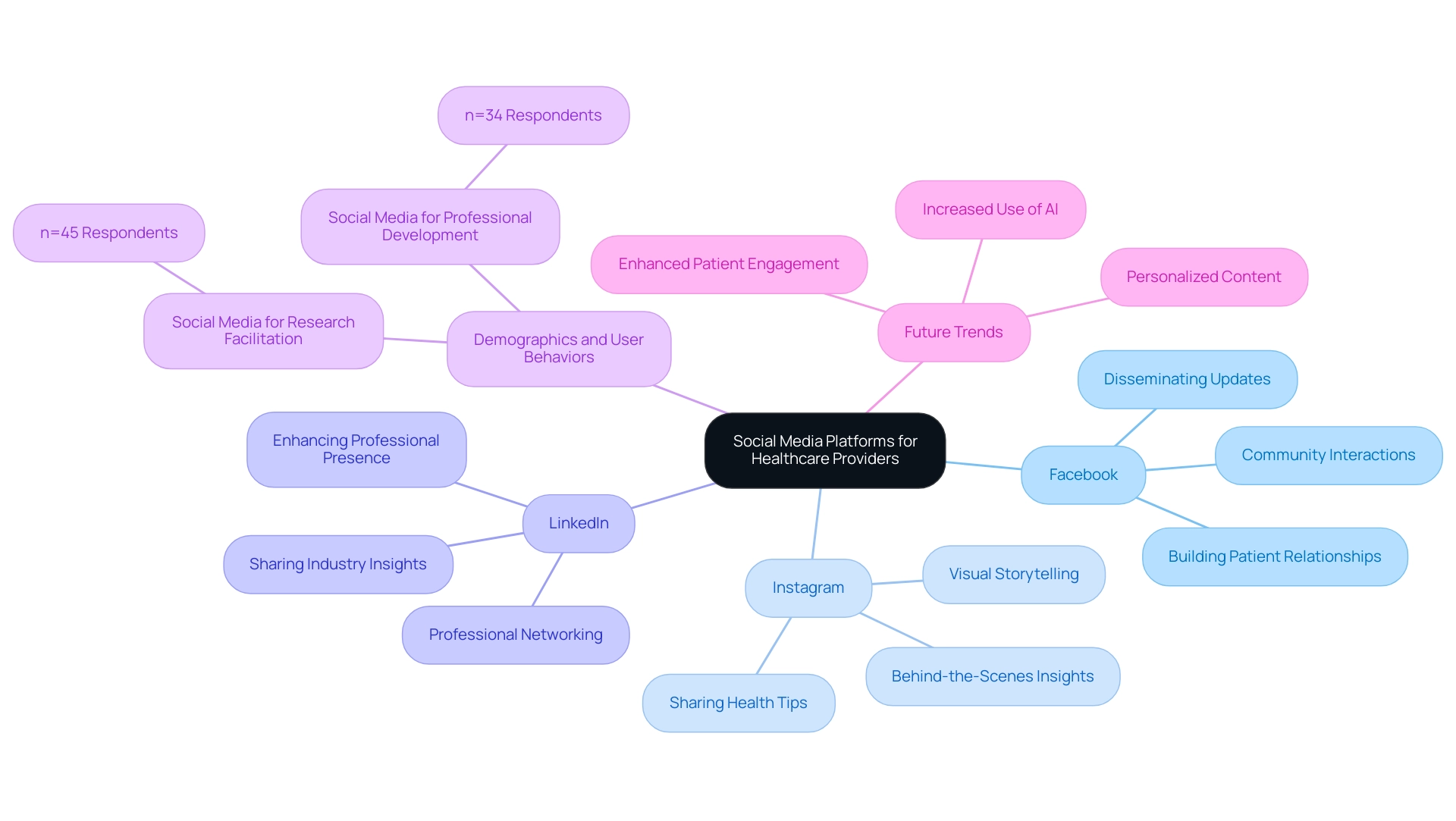
Creating Engaging Content for Patient Interaction
Producing captivating material is essential for fostering significant interactions with individuals through social media marketing for doctors. With Facebook being the most popular online platform among over 1,500 hospitals, medical professionals should prioritize social media marketing for doctors on this channel. Delivering informative and relatable content, such as health tips, frequently asked questions (FAQs), and genuine testimonials, is essential for successful social media marketing for doctors.
By leveraging diverse content formats—including videos, infographics, and live Q&A sessions—clinics can significantly enhance engagement levels with effective social media marketing for doctors. However, it’s important to address concerns regarding the legitimacy of information, privacy, and institutional barriers that can affect social media use in healthcare. Responding promptly to comments and messages is equally important, as it cultivates a sense of community and trust among individuals.
This proactive approach not only encourages patients to engage more frequently but also motivates them to share their experiences with others, which is a key aspect of social media marketing for doctors. Remarkably, almost 90% of hospitals presently use online platforms for social media marketing for doctors to promote wellness, highlighting the possible reach and impact of well-designed content strategies in the medical field. Moreover, insights from case studies indicate that CPD providers can improve their engagement by identifying professionals who are receptive to utilizing online platforms for professional growth and connecting them with pertinent content.
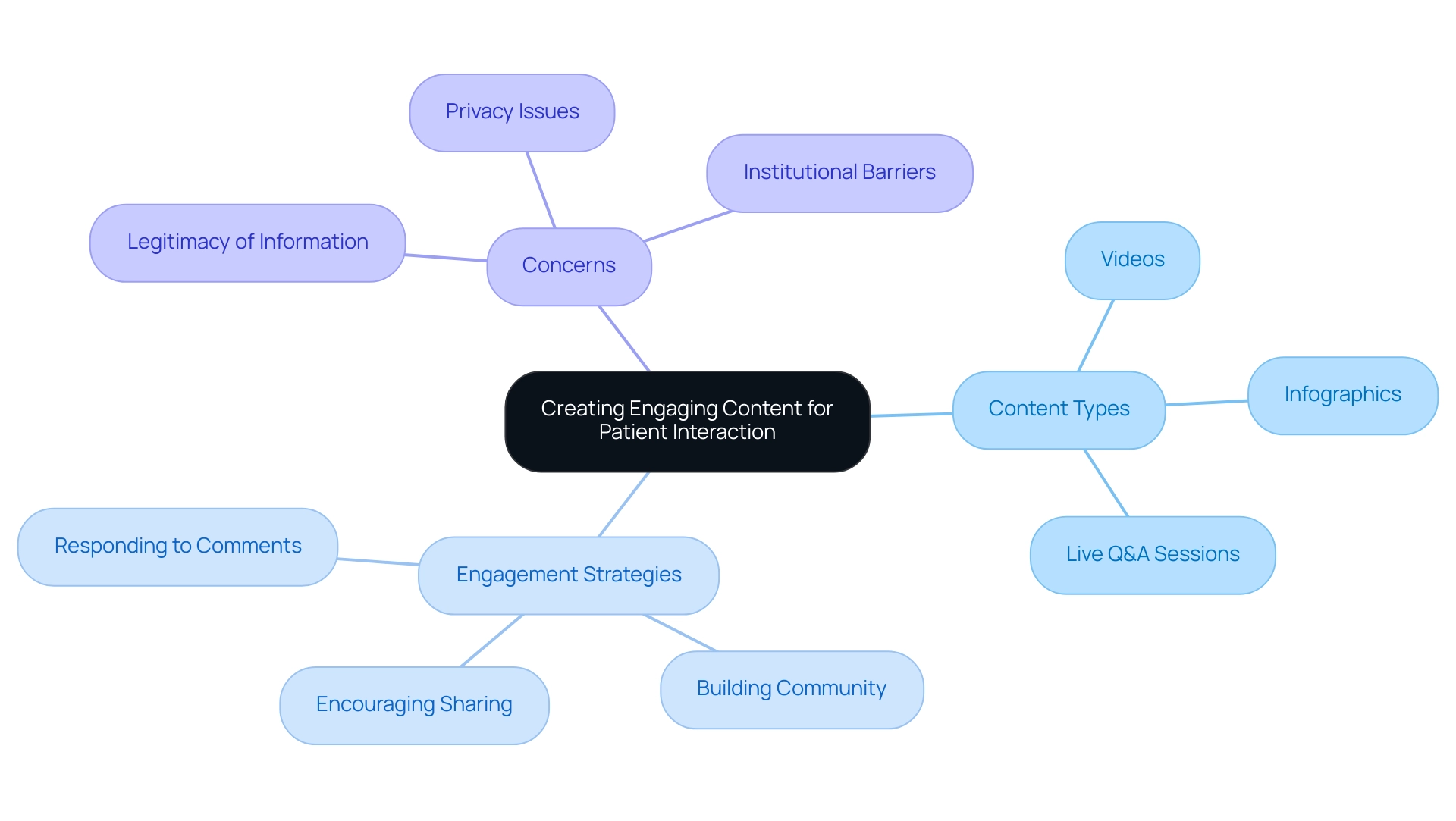
Navigating Ethical Considerations in Social Media Marketing
Navigating ethical considerations in social media marketing for doctors is essential for medical professionals. Adhering to regulations like HIPAA is crucial, as it protects individual privacy and forbids the sharing of confidential information on public platforms. As highlighted in the study (PMID 26293861), K Denecke from the University of Leipzig emphasizes the ethical issues surrounding online platforms in healthcare, particularly the importance of diligence in maintaining professionalism.
This diligence is essential, as interactions must reflect accuracy and respect to build trust with clients. Moreover, a case study titled ‘Online Platforms for Research Purposes‘ illustrates the ongoing challenges in establishing trust between researchers and participants in online environments, emphasizing the necessity of ethical practices in these interactions. Setting clear protocols for online platform usage within a practice not only reduces risks but also ensures that social media marketing for doctors adheres to ethical standards, thereby promoting effective interaction with patients.
As the landscape of social media continues to evolve, it is imperative for healthcare providers to remain vigilant in upholding these principles to successfully engage in social media marketing for doctors and navigate the complexities posed by digital communication.
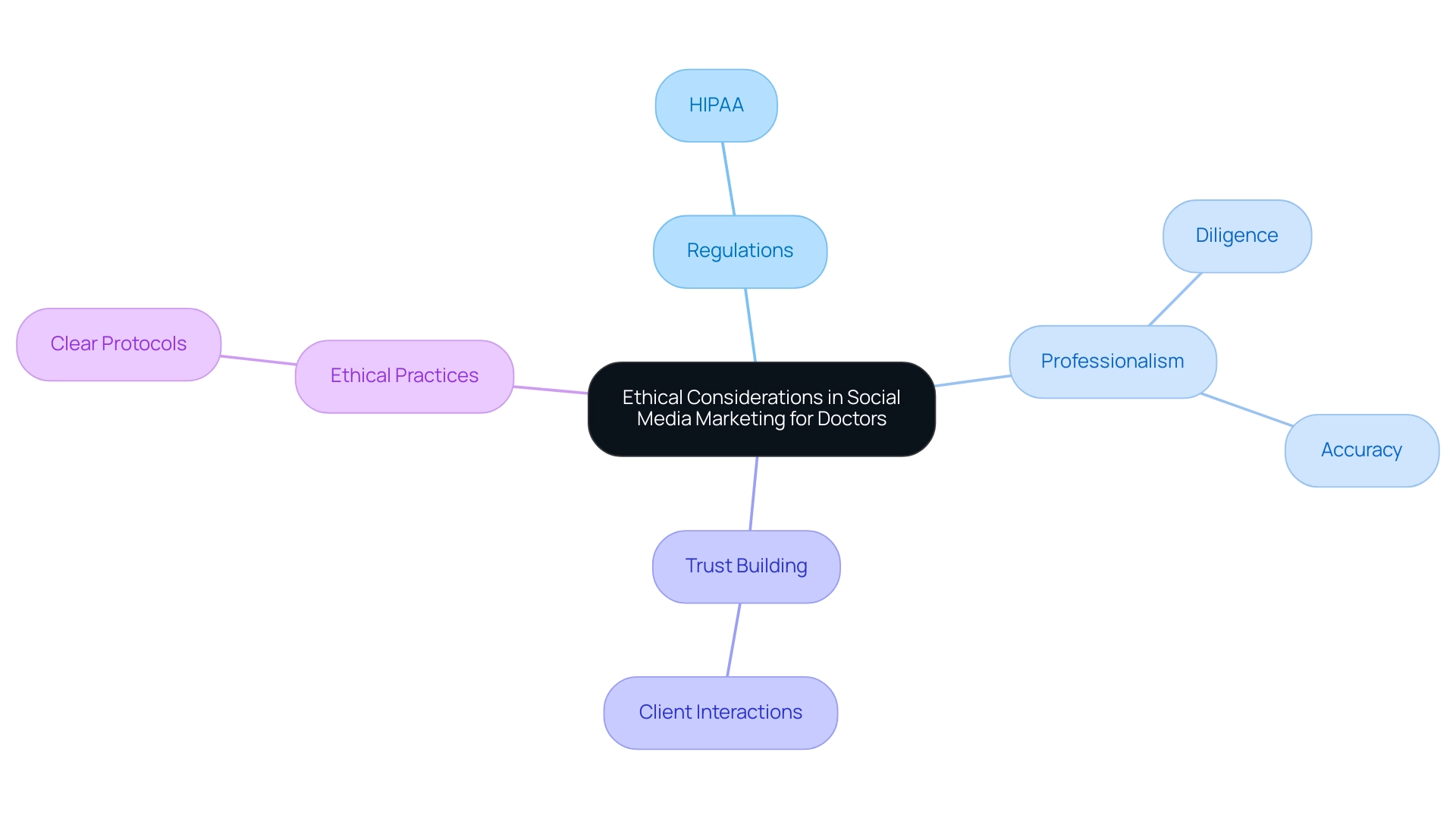
Conclusion
The integration of social media marketing into the healthcare sector is reshaping how medical professionals engage with patients and promote their services. By strategically utilizing platforms like Facebook, Instagram, and LinkedIn, healthcare providers can enhance their visibility and foster meaningful connections. As outlined, the significance of a robust digital presence cannot be overstated, with projections indicating substantial growth in healthcare advertising and increasing reliance on AI tools for effective marketing strategies.
Selecting the right platforms is crucial for maximizing outreach and engagement. Each social media channel offers unique opportunities for communication, from community-building on Facebook to professional networking on LinkedIn. Creating engaging content tailored to patient needs is equally important, as it drives interaction and fosters trust. As healthcare organizations continue to adapt their strategies, they must prioritize delivering informative and relatable content while addressing ethical considerations to protect patient privacy and maintain professionalism.
Ultimately, the successful implementation of social media marketing in healthcare hinges on understanding the dynamics of digital communication and the evolving preferences of patients. By embracing these strategies and remaining compliant with ethical standards, healthcare professionals can significantly enhance patient engagement, improve outcomes, and position themselves effectively in a competitive landscape. The future of healthcare marketing lies in the thoughtful application of these principles, ensuring that both patients and providers benefit from stronger connections and improved health literacy.

